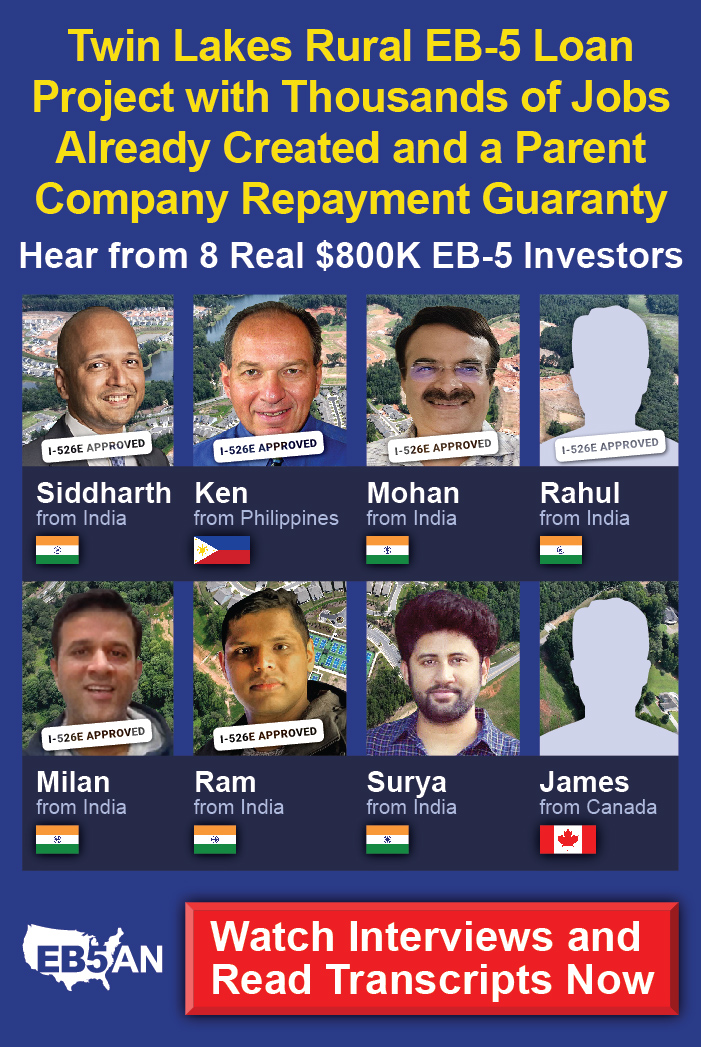How long does it take for a Green Card to arrive? Green card processing times differ depending on the immigrant visa application and the applicant.
For instance, green card processing for a family based green card or marriage based green card is faster than for an investor immigrant visa. The average processing time for an immigrant visa can be as little as six months for refugees or as much as ten years for investors from backlogged countries.
All immigrant visa applications are submitted to United States Citizenship and Immigration Services (USCIS). This article will detail the application process for the four main ways to get a green card.
Here’s What We’re Going to Cover:
What Is a U.S. Green Card
What Types of U.S. Green Card Can You Get?
- Employer Sponsor Green Card Visas
- Family Based Green Card
- Refugee and Special Immigrant Green Cards
- Investor Green Cards
What Are The Processing Times For The U.S. Green Card?
How Can You Track the Progress of Your U.S. Green Card?
- How to Track the U.S. Green Card from Inside the U.S.
- How to Track the U.S. Green Card from Outside the U.S.
What Are the Rights You Will Enjoy as a Green Card Holder?
What Are the Responsibilities You Will Have as a Green Card Holder?
Points to Remember
What Is a U.S. Green Card
A U.S. Green Card is a lawful permanent resident card granting a foreign national legal immigration to the United States. Green Card holders may live, work, and study anywhere in the United States permanently.
Foreign nationals with U.S. permanent resident status can travel both domestically and internationally, change jobs, or move states. Green card holders may receive social security and other welfare benefits.
Children with Green Cards can attend U.S. public schools for free and have a higher chance of getting into top U.S. universities over international students without a green card.
What Types of U.S. Green Card Can You Get?
There are four main types of U.S. Green Card:
- Employer Sponsor Green Cards
- Family Based Green Cards
- Refugee and Special Immigrant Green Cards
- Investor Green Cards
The eligibility requirements, supporting documentation, and petitions, differ between each of the various Green Cards in these categories. Immigration attorney or lawyer fees will also apply.
Employer Sponsor Green Cards
EB-1 Green Card: Exceptional Ability
- Eligibility: Workers with extraordinary ability, outstanding foreign researchers or professors, multinational managers and executives.
- No labor certification required. Workers of extraordinary ability file themselves. Professors, researchers, managers, and executives must have an employee sponsor.
- Petition: Form I-140, Petition for Alien Worker
- Filing Fee: $700.
EB-2 Green Card: Workers with Advanced Degrees
- Eligibility: Workers with exceptional ability or professionals with an advanced degree and five years of experience working professionally in their field.
- Labor certification and a permanent job offer is required. The U.S. employer must petition the U.S. Department of Labor on the worker’s behalf.
- Petitions: Form I-140, Petition for Alien Worker; Form ETA-9089, Application for Permanent Employment Certification.
- Filing Fees: $700 for an I-140 petition. There is no filing fee for labor certification.
EB-3 Green Card: Professionals and Skilled Workers
- Eligibility: Professionals and skilled workers whose jobs require a U.S. baccalaureate degree or equivalent, or at least 2 years of training.
- Labor certification and a permanent job offer is required. The U.S. employer must petition the U.S. Department of Labor on the worker’s behalf.
- Petitions: Form I-140, Petition for Alien Worker; Form ETA-9089, Application for Permanent Employment Certification.
- Filing Fees: $700 for an I-140 petition. There is no filing fee for labor certification.
Family Based Green Cards
Family based immigrant visas are for a family member of a U.S. citizen or legal permanent resident. This is often called a “marriage green card” for spouses.
- Eligibility: Spouses, children, and parents of U.S. citizens, as well as spouses, children, and siblings of lawful permanent residents.
- The “90-Day Rule” is a USCIS guideline to prevent immigration fraud. Foreign nationals should not change immigration status within 90 days after arriving in the United States.
- Petitions: Form I-130, Petition for Alien Relative and Form I-485 to adjust immigration status.
- Filing Fees: $535, plus a $85 biometric service for fingerprinting.
Refugee and Special Immigrant Green Cards
EB-4 Green Card: Religious Workers and Special Immigrants
- Eligibility: Religious workers, medical physicians, broadcasters, employees of the U.S. armed forces, Panama Canal, or other U.S. interests.
- Religious workers may sponsor themselves. Eligibility and sponsorship requirements differ between eligible special immigrant types. Please consult USCIS for more guidance.
- Petition: Form I-360, Petition for Amerasian, Widow(er), or Special Immigrant.
- Filing Fee: $435.
Refugee and Asylum Green Cards
- Eligibility: Applicants must have been granted asylee or refugee status more than one year ago and have been physically present in the United States for more than one year.
- Petitions: Form I-485 to adjust status.
- Filing Fee: $0.
Investor Green Cards
EB-5 Green Card: Immigrant Investors
- Eligibility: Accredited foreign investors who invest a minimum of $800,000 in a new commercial enterprise (NCE) that creates or sustains at least 10 full-time permanent jobs in the United States. No employer sponsor or job offer is required.
- Investment capital must be lawfully-sourced and financially “at risk” for at least two years. The 10 created jobs must be sustained and filled for at least two years.
- Petitions:
- Form I-526/ I-526E: After making the qualifying investment, foreign nationals file an EB-5 immigrant petition. Form I-526 is for direct investors. Form I-526E is for regional center investors.
- Form I-485: Foreign nationals residing in the U.S. may concurrently file Form I-485 for adjustment of status at the same time as Form I-526/I-526E. Foreign nationals outside the U.S. must file Form DS-260 after receiving I-526/I-526E approval.
- Once approved, the investor and their family will be granted two-year conditional permanent resident status in the United States.
- Form I-829: In the last 90 days of conditional permanent residency, investors apply to remove conditions from their green cards and become full permanent residents.
- Filing Fees:
- EB-5 Investment: $800,000 minimum for projects located in targeted employment areas (TEAs).
- Form I-526/I-526E: $3,675.
- Form I-485: $1,140 for adults, $750 for children applying with a parent. For applicants outside of the U.S., Form DS-260 has a filing fee of $345.
- Form I-829: $3,750.
- $85 biometric services fee per applicant.
- $1000 fee to support the EB-5 Integrity Fund.
What Are the Processing Times for the U.S. Green Card?
Processing times for U.S. green cards differ depending on the type of green card being applied for, as well as the individual applicant’s situation.
| Employer Sponsor Green Card |
|
| Family Based Green Card |
|
| Special Immigrants and Refugee Green Card |
|
| Investor Green Card |
|
How Can You Track the Progress of Your U.S. Green Card?
This section will provide foreign nationals a guide to help track the progress of their green card application.
USCIS sends Form I-797, an applicant’s Green Card Approval Notice, via postal mail. Form I-797 is also known as an applicant’s “welcome notice”. Visa applicants do not need to fill out any information on Form I-797.
To track a Green Card by mail, foreign nationals both inside and outside the United States can register for Informed Delivery with the United States Postal Service (USPS). Informed Delivery allows applicants to receive email and text updates on any expected mail.
Expedited visa processing is available for some visas (E-1, E-2, E-3, etc.) in certain cases. With expedited processing of immigration applications, USCIS action is taken within about 15-45 days. Form I-907 for expedited processing can be concurrently filed with an immigration petition for eligible visas.
How to Track the U.S. Green Card from Inside the U.S.
Foreign nationals living within the United States can track their Green Card processing with USCIS’ “Case Status Online” tool.
Applicants can find their receipt number on Form I-797C, the USCIS filing receipt for their I-485 petition. Enter this alphanumeric receipt number on the Case Status Online tracker and click “Check Status”.
How to Track the U.S. Green Card from Outside the U.S.
Foreign nationals residing outside the United States can track their Green Card through the National Visa Center (NVC), the government organization that processes and delivers visas for foreign applicants.
After USCIS accepts a green card application, NVC sends applicants a notification email or letter containing an alphanumeric case number.
Foreign nationals can then click “Check My Visa Application Status” on the NVC’s online Consular Electronic Application Center (CEAC), choose their visa type from the dropdown menu, and enter their individual case number to check their visa processing.
Applicants outside the United States must contact the National Visa Center at least once a year in order to prevent the termination of their green card application.
What Are the Rights You Will Enjoy as a Green Card Holder?
Green Card holders are protected by all federal laws of the United States of America, as well as all laws of their state of residence and local jurisdiction.
As a lawful permanent resident of the United States, Green Card holders have the right to live anywhere in the United States without restriction. Green card holders may work any legal job of their choosing and qualification.
What Are the Responsibilities You Will Have as a Green Card Holder?
Green Card holders are required to obey all federal laws of the United States, as well as any and all laws of their local and state jurisdictions.
Green Card holders cannot vote in U.S. federal, state, or local elections. Only U.S. citizens are allowed to vote. Permanent residents must file income tax returns every year and pay all required taxes, both federal and state.
Males between the ages of 18-25 must register with the Selective Service for the military draft. Military service is not required, but males may be drafted in the event of war or emergency.
Typically, Green Cards must be renewed every 10 years. To renew, lawful permanent residents must fill out Form I-90.
Points to Remember
There are many pathways to receiving a U.S. Green Card, each with its own requirements, petitions, and documentation. An immigration attorney can help ensure the greatest possible compliance when applying to become a U.S. Permanent Resident.
Working with an experienced immigration consulting team can also streamline the Green Card process. EB5AN has helped over 2,000 families from more than 60 countries achieve permanent resident status in the United States.
Schedule a free consultation or email EB5AN today at info@eb5an.com














